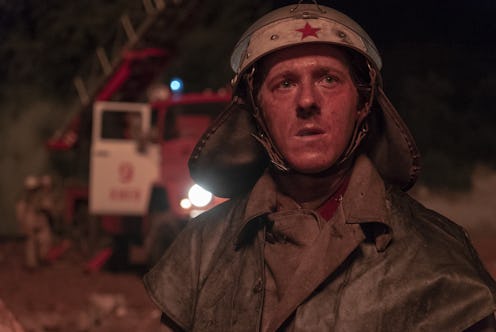Entertainment
The Real Story Of Vasily Ignatenko From 'Chernobyl' Is Just As Horrific As It Is Heroic

HBO's Chernobyl is not the story of any one person, but the story of many people whose lives were irreparably changed because of their proximity to the explosion at the Chernobyl nuclear power plant in 1986. One of the characters it focuses on is Vasily Ignatenko, a real person played by Adam Nagaitis. He was a first responder at the Chernobyl explosion and was exposed to radiation as a result. Vasily died soon afterward due to complications from the exposure, and his death is depicted in gruesome detail on the show.
Of course, Vasily wasn't able to tell his story himself, but his memory and experience have since been shared by his wife, Lyudmilla Ignatenko, who recounted his final days to author Svetlana Alexievich for her Nobel prize-winning 2015 book Voices of Chernobyl: The Oral History Of A Nuclear Disaster. And as demonstrated in an excerpt from Alexievich's book published by The Guardian, Lyudmilla's account conveys not only the horrors of what happened to those affected by radiation, but the confusion and uncertainty that surrounded the Chernobyl explosion as a whole.
"They tried to beat down the flames," Lyudmilla said of Vasily and the other firefighters on the scene. "They kicked at the burning graphite with their feet ... They weren't wearing their canvas gear. They went off just as they were, in their shirt sleeves. No one told them [about the risk of radiation]." She was told by a doctor that Vasily's central nervous system and skull were completely compromised, and that she could not to cry while visiting him in the hospital he was being treated at. "'If you start crying, I'll kick you out right away. No hugging or kissing. Don't even get near him. You have half an hour,'" she recalled the doctor saying.
The reason that Lyudmilla was not allowed to touch her husband soon became clear as his body started to deteriorate from the radiation. "He was producing stools 25 to 30 times a day, with blood and mucous. His skin started cracking on his arms and legs. He became covered with boils. When he turned his head, there'd be a clump of hair left on the pillow," she wrote. "I tried joking: 'It's convenient, you don't need a comb.'" Exactly 14 days after first being brought to the hospital, Vasily died, just as all the firefighters that visited Chernobyl the night of the explosion did.
There are many others who suffered because of the Chernobyl explosion — some sources estimate the death toll as high as 60,000 —but Lydumilla's account of Vasily's death provides the emotional core of Chernobyl, reflecting how an idyllic marriage between two young newlyweds can be turned into a tragic love story due to circumstances outside of their own control. Vasily was just one of many who died because of the Chernobyl explosion, but his death serves as a grueling reminder that those who died in the explosion were merely victims of circumstance who never fathomed something like what happened at Chernobyl was possible.